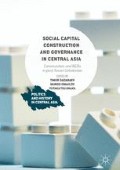Abstract
This chapter will analyze an indigenous institution that has been continuously referred to in the context of social capital construction: the neighborhood community or Mahalla. While Central Asian local communities, such as the Mahalla, have gained considerable footing in recent years, there is still no consensus on the role of these communities in the construction of the new states and societies of the region. The main thrust of this chapter is to suggest that community represents one of a few effective traditional substitutes to unite the representatives of various ethnic and religious groups through creation of common identity based on a shared residence criterion. In addition, while Central Asia faces all possible evils, such as environmental hazards and economic shortcomings, these problems cannot be addressed without localizing public dissatisfaction and creating public consent within smaller communities like the Mahalla. However, throughout the history of these communities, political authorities have often been attempted to manipulate these institutions in order to enhance their legitimacy in the eyes of both their population and other governments.
Access this chapter
Tax calculation will be finalised at checkout
Purchases are for personal use only
Bibliography
Abashin, S. (2015). Sovetskij Kishlak: Mezhdu kolonializmom i modernizatsiei. Moskva: Novoe literaturnoe obozrenie.
Abramson, D. M. (1998). From Soviet to Mahalla: Community and transition in post-soviet Uzbekistan (From Soviet to Mahalla). Ph.D. dissertation, UMI Microfilm, Indiana University.
Belenitski, A. M., Bentovich, I. B., & Bol’shakov, O. G. (1973). Srednevekovyj Gorod Srednej Azii. Leningrad: Nauka.
Critchlow, J. (1991). Nationalism in Uzbekistan: A Soviet Republic’s road to sovereignty. Boulder: Westview Press.
Dadabaev, T. (2013a). Recollections of emerging hybrid ethnic identities in Soviet Central Asia. Nationalities Papers: The Journal of Nationalism and Ethnicity, 41(6), 1026–1048.
Dadabaev, T. (2013b). Community life, memory and a changing nature of Mahalla identity in Uzbekistan. Journal of Eurasian Studies, 4(2), 181–196.
Dadabaev, T. (2015). Identity and memory in post-soviet central Asia (p. 214). London/NY: Routledge, Taylor and Francis.
Dadabaev, T., & Komatsu, H. (Eds.). (2017). Kazakhstan, Kyrgyzstan and Uzbekistan: Life and politics during the Soviet Era. New York, NY: Palgrave.
Geiss, G. P. (2001). Mahalla and Kinship relations: A study on residential communal commitment structures in Central Asia of the 19th century. Central Asian Survey, 20(1), 97–106.
G‘ulomov, M. (2003). Mahalla-Fuqarolik Zhamiiatning Asosi. Tashkent: Adolat.
Humphrey, C. (1983). Karl Marx collective: Economy, society, and religion in a Siberian collective farm. Cambridge: Cambridge University Press.
Husanov, O. (1996). Mustaqillik va Mahallyi Hokimyat (huquqyi, tashiqiliy masalalar va muammolar). Sharq: Toshkent.
Kamilov, K. (1961). O roli makhallinskikh (kvartal’nykh) komitetov v sovremennyi period (v gorodakh Uzbekistana). Obschestvennye nauki v Uzbekistane, N.2.
Kandiyoti, D. (1998). Rural livelihoods and social networks in Uzbekistan: Perspectives from Andijan. Central Asian Survey, 17(4), 561–578.
Kotler, Y. (1961). Makhallia reshaet i deistvuet. Sovetskij Soyuz, N.12.
Kulchik, Y., Fadin, A., & Sagdeev, V. (1996). Central Asia after the Empire. London: Pluto Press.
Logofet’, D. N. (1911). Buharskoe Hanstvo: Pod Russkim Protektoratom, Tom II, S-Peterburg: Izdal V. Berezovskij.
Makhallada Tarbiia. (1970). Toshkent: Yosh gvardiia.
Makhallinskie komitety Tashkenta: Tsyfry i fakty. (1990). Agitator Uzbekistana, N.7.
Micklewright, J., Coudouel, A., & Marnie, S. (2001, January). Targeting and self-targeting in a transitional economy: The Mahalla social assistance scheme in Uzbekistan. Florence: United Nations Children’s Fund, International Child Development Centre.
Ochilov, Sh. G. (1990). Iz opita razvitiya obshestvennogo samoupravleniya v Uzbekistane, Obshestveniie Nauki v Uzbekistane, No.8.
Polozhenie o Makhallinskikh komitetakh Tashkenta. (1990). Vechernyi Tashkent, 19 oktiabria.
Polozhenie o makhallinskikh (kvartal’nykh) komitetakh v gorodakh Uzbekistana. (1932). Sbornik Ustavov, N.17.
Polozhenie ob Obschikh Sobraniyakh (Skhodakh) Grazhdan v Sel’skikh Mestnostyakh Uzbekskoi SSR Utverzhdeno Ukazom Prezidiuma Verkhovnogo Soveta Uzbekskoi SSR, 30 avgusta 1961. (1963). Spravochnik Aktivista-Obschestvennika: Sbornik ustavov I polozhenii samodeiatel’nykh organizatsii trudyaschikhsya, Tashkent.
Rakhimov, K. (1989). Makhalla, nachalo nachal: Obychai i sud’ba. Nauka i Religiia, N.9.
Rasanayagam, J. M. (2002a). The moral construction of the state in Uzbekistan: Its construction within concepts of community and interaction at the local level. Ph.D. dissertation, Cambridge University, Kings College.
Rasanayagam, J. M. (2002b). Spheres of communal participation: Placing the state within local modes of interaction in rural Uzbekistan. Central Asian Survey, 21(1), 55–70.
Sievers, W. E. (2002). Uzbekistan’s Mahalla: From Soviet to absolutist residential community associations. The Journal of International and Comparative Law, 2, 92–158.
Sotsialisticheskie Obriady v Zhizn’. (1987). Tashkent: Uzbekistan, p. 14.
Spravochnik Aktivista-Obschestvennika: Sbornik ustavov I polozhenii samodeiatel’nykh organizatsii trudyaschikhsya. (1963). Tashkent.
Suhareva, O. A. (1976). Kvartal’naya Obshina Pozdnefeodal’nogo Goroda Buhari (V svyazi s istoriei kvartalov). Moskwa: Nauka.
Umarkhodzhaeva, O. (1987). Makhallinskii Komitet dejstvuet. Agitator Uzbekistana, N.17.
Author information
Authors and Affiliations
Editor information
Editors and Affiliations
Copyright information
© 2017 The Author(s)
About this chapter
Cite this chapter
Dadabaev, T. (2017). Between State and Society: The Position of the Mahalla in Uzbekistan. In: Dadabaev, T., Ismailov, M., Tsujinaka, Y. (eds) Social Capital Construction and Governance in Central Asia. Politics and History in Central Asia. Palgrave Macmillan, New York. https://doi.org/10.1057/978-1-137-52233-7_4
Download citation
DOI: https://doi.org/10.1057/978-1-137-52233-7_4
Published:
Publisher Name: Palgrave Macmillan, New York
Print ISBN: 978-1-137-52232-0
Online ISBN: 978-1-137-52233-7
eBook Packages: Social SciencesSocial Sciences (R0)

